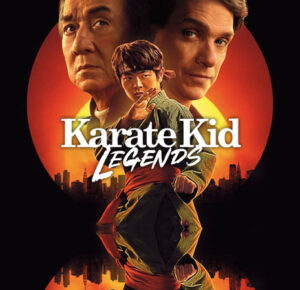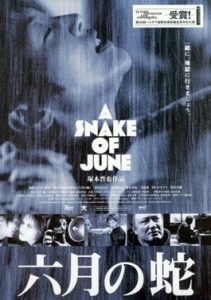Director: Wai Ka-Fai
Producer: Johnnie To
Cast: Lau Ching-Wan, Francis Ng, Carman Lee, Ruby Wong, Cheung Tat-Ming, Tsui Kam-Kong, Joe Cheng, Matthew Chow, Sung Boon-Chung
Running Time: 90 min.
By Joe909
This was the first Milkyway Image movie I saw, and it’s still one of their very best. Hong Kong movies are known for being fast-paced, but Too Many Ways is faster-paced than most. The ideas, plots, and crazed situations that are stuffed into its compact, 90-minute frame are each interesting enough to fill up their own movie.
To give a better review of the film, I need to enter spoiler territory. So here we go: Lau Ching-Wan is Kau, a 32 year old, small-time rascal who’s hounded by fellow rascal Bo to go along on a crime-trip to Central China with a gang Bo has recently put together (incidentally, one of the gang members is identical to Sean Lennon, even wearing the same, geeky glasses). However, Kau (as we see in the very end of the movie) has recently had his fortune told, and the prediction was that he would soon be asked to go to either Taiwan or Central China. Depending upon his choice, Kau’s life could take either of two turns: good or bad.
Too Many Ways shows us what would happen with each choice. In the first, Kau goes to Central China. It’s a botchery from the beginning: the gang robs a massage parlor, Bo gets run over by a car in their escape, the guys later bury Bo behind a wall (with his pager), and, once they get to China, not only do they lose another member, but they find that the people they were to meet are owed money by Bo. The guys later hook up with Bo’s ex-wife, who tells them about a new job coming up. This job is just as botched as the last. By the end of this 30-minute segment, everyone is dead, including Kau.
The next section shows us what happens if Kau refuses Bo’s offer. It picks up with the massage parlor scene from earlier, however this time Kau offers all the money he has to pay for the exorbitant bill. Kau doesn’t go to China with the rest of the gang, but Matt (Francis Ng), another member who did not go with the others, pleads with Kau to come with him to Taiwan, where Matt has been offered the job of killing a triad leader. This job has a better ending for Kau than the previous one, but that’s not to say that he doesn’t get messed up pretty badly, or doesn’t eat any dog sh*t (!).
Probably the only problem with Too Many Ways To Be No. 1 is that the second half pales in comparison to the first. The opening 30 minutes of this movie contains some of the most energetic, hilarious scenes ever written. Guys jabbering in pidgin English as they die. A woman dying of an orgasm. Crooks stopping by the local convenience store to casually pick up pantyhose, to wear as masks in their robbery. Blood actually getting on the camera in the ensuing fight. So much stuff happens in this opening half that it seems impossible for the movie to keep up the breakneck pace, and it doesn’t: the second half is much slower, and longer as well. But that isn’t to say that it’s no less original; it’s just not as crazed.
Wai Kai-Fai wrote and directed the movie, and he’s a genius. His directing style isn’t the assured smoothness of Johnnie To; instead, it’s just as chaotic and novel as the script. The camera goes everywhere, hanging off the ceiling, going upside-down, swinging back and forth. The colors in the movie are also strange: they’re so harsh that sometimes you can barely see what’s going on. I doubt this is from a poor dvd/vcd transfer, as even the film print I saw had a crazy color scheme. The music too is great: it sounds like a cross between bachelor-pad muzak and trip-hop. This side of a Raymond Wong score, it’s the best music I’ve heard in an HK movie.
This is the kind of movie that demands many viewings. Each time you’ll notice or figure out something new: like, why Kau looks at his hands in each story, or how some characters have the same fate, regardless of Kau’s decision, or who that car almost hits in the second story, the one that ran over Bo in the first.
Too Many Ways To Be No. 1 is a great introduction to Milkway: it has Lau Ching-Wan, the rest of the cast is great, and its like nothing you’ve seen before. Milkyway is known for deconstructing crime movies, but they’ve never done anything as close to deconstruction as Too Many Ways. Most of the movie is in Mandarin, too, which is unusual for an HK production. But regardless, this film comes highly recommended. It’s so cool, it not only refers to Bruce Lee (“32 is an important age for a man. I’m 32. You’re 32. Bruce Lee was 32 when he died.”), but there are also posters of Bruce Lee hanging from the walls in the massage parlor.
Joe909’s Review: 9.5/10
By Numskull
Wow. I can’t remember the last time so much stuff took place in a mere 91 minutes. Maybe it’s never happened before. That would be right in character for this movie, because it’s fresh and original in the best senses of those much-abused terms.
Lau Ching-Wan heads a fine cast in what is, essentially, a gangster story (not “another” gangster story, mind you). The focus isn’t on gunplay or revenge, though. The focus is on knocking the viewer on his or her duff with some truly awesome camera work. The camera…they eye through which we observe this rogue’s gallery of buffoons and badasses in their doomed endeavors to rake in the bucks any way they can, so long as it’s not legal…is almost like a character in and of itself; it sways from side to side on a dance floor, stoops down low when a guy scampers down a hallway on all fours, and whips back and forth between Point A and Point B during tense moments, like a person standing there, looking around, trying to figure out what to do. Cinematography like this emphasizes artistry and dramatic impact over technical know-how but manages to avoid the look and feel of a poorly shot family reunion (or a Blair Witch Project).
The viewer manipulation really is uncanny. A shootout in the dark, lit up only sporadically by random gunfire, creates a dizzying, strobe light-like effect. A robbery in the early going is filmed upside-down, thus emphasizing the chaos and confusion of the moment. And one scene that makes you want to shout “WHAT’S GOING ON, DAMMIT?!?” depicts a bunch of people with horrified expressions running out of frame to the site of…ah, that’s the beauty of it: the viewer is the last one to find out exactly what happens, because the camera refuses to move until everybody else is aware of the situation.
A comparison to Reservoir Dogs and/or Pulp Fiction could easily be made for two reasons. One is because this film disregards proper chronological order in favor of dynamic storytelling. The other is because, although plenty of violence is implied and there are many potentially explosive situations, the amount of carnage that actually gets shown really isn’t that high. The category III rating is probably more due to the “death by excessive fornication” scene.
But you know what? F*ck that sh*t. Too Many Ways To Be Number One is far superior to anything with Tarantino at the helm, if not in polish then certainly in artistic merit and overall entertainment value. I’m more reminded of the work of Danny Boyle (director of the under-rated Shallow Grave and the over-rated Trainspotting).
Like I said before, a whole lot of sh*t transpires in this movie, given its short length. When all is said and done, you feel like much more time than an hour and a half has elapsed due to all of the different directions in which the plot/plots goes/go. If the same story had been shot in Hollywood, the film would have turned out 20 or 25 minutes longer…maybe even more. As is, though, Too Many Ways To Be Number One doesn’t bottle-feed the viewer. The film makers apparently thought highly enough of the audience to trust them not to get lost. This may actually be the movie’s biggest downfall; it tries to accomplish too much, tries to tell too big a tale, for its limited duration. The subtitles compound this problem; the DVD from City Laser has blurry, white, VHS-style text instead of the remastered greatness to be expected from some of the other labels, and as usual, you just know that some of the intricacies of the script get lost in translation. This isn’t a catastrophic flaw; just a warning that you’ll most likely have to hit the pause button a few times to keep up. And, at the very least, the subtitles don’t get chopped off at the bottom of the screen like they do on so many poorly-produced video tapes.
One last thing…the music. Holy sh*t. This may be the catchiest music I’ve ever heard in a movie. Quirky and in-your-face (well, ears actually) but not abrasive. My foot took on a life of its own, it did.
All in all, a bold and thoroughly amusing movie worth seeing more than once. Don’t watch it while you’re tripping, though. No telling what sort of sh*t might go through that cavernous head of yours.
Numskull’s Rating: 8/10
By Vic Nguyen
Milky Way Image partner Wai Ka-fai embarks on his next directorial product with this superbly written, brilliantly filmed black comedy that is unquestionably another in a long line of masterpieces from the Milky Way Film Group. Here, Lau Ching-wan and Francis Ng Chun-yu lead a cast of characters that can’t seem to avoid unfortunate obstacles and mindnumbing situations in their quest for success among the triad ranks.
Despite the exemplary performances from a diverse cast (including underrated performer Tsui Kam-kong), the real star of this film is the camera, which is experiment personified. From filming an action sequence completely upside down to shooting a gunfight in complete darkness (with the gunfire providing the only illumination), there are no boundaries set to where the camera can go. It’s dizzying in a way, but in the end, the film ultimately benefits from this display of rich, exciting, avant garde-ish brand of movie-making, a trend which has become increasingly rare in today’s age of filmmaking.
The bottom line, a must see masterpiece that becomes increasingly entertaining upon multiple viewings.
Vic Nguyen’s Rating: 10/10






















Be the 1st to Comment